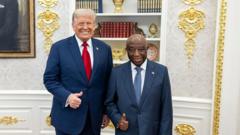Amid ongoing political turmoil in Brazil following Jair Bolsonaro's election loss, U.S. President Trump has introduced a 50 percent tariff on all Brazilian imports. The move comes as Bolsonaro's son seeks support in Washington against what he calls a "witch hunt" by Brazilian authorities.
Trump Imposes Tariffs on Brazil Amid Political Tensions Surrounding Bolsonaro

Trump Imposes Tariffs on Brazil Amid Political Tensions Surrounding Bolsonaro
The U.S. government has announced a significant tariff on Brazilian imports, escalating political tensions linked to former Brazilian President Jair Bolsonaro's legal battles.
As Brazil navigates the aftermath of the controversial 2022 elections, political dynamics have intensified, particularly concerning former President Jair Bolsonaro's legal struggles. Bolsonaro's son, Eduardo, has made several trips to Washington, attempting to rally support against Brazilian Supreme Court justice Alexandre de Moraes, who is overseeing his father's prosecution related to alleged election fraud claims.
Eduardo Bolsonaro, a member of Brazil's Congress, has characterized the legal actions against his father as a politically motivated attack. In his advocacy efforts, he has sought sanctions against the Brazilian judge, presenting the situation as a matter of political persecution reminiscent of challenges faced by former U.S. President Trump during his own presidential campaign.
In a surprising turn of events, President Trump chose to act not with targeted sanctions but with sweeping tariffs. Starting August 1, the U.S. will impose a 50 percent tariff on all Brazilian imports, a measure Trump described as a response to what he perceives as an unjust prosecution of Bolsonaro. "This is nothing more, or less, than an attack on a Political Opponent—something I know much about!” Trump expressed in a declaration that resonated with his base who often view government actions against politicians as partisan warfare.
The imposition of tariffs not only complicates economic relations between the two countries but also illustrates how international trade policies can intertwine with domestic political struggles, raising questions about the broader implications for U.S.-Brazil relations and the global economy.
As Jair Bolsonaro prepares to stand trial amid these rising tensions, the unfolding situation continues to capture attention both in Brazil and around the world, with observers keenly watching how these political and economic maneuvers will play out in the coming months.





















